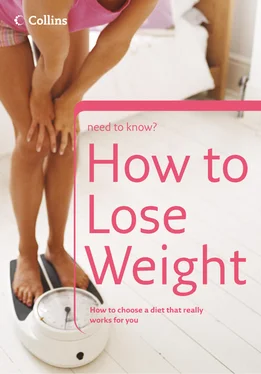must know
Weight reduction benefits
Here is an overview of the average benefits of a 10 per cent (10 kg or 22 lb) reduction in weight of a man with a starting weight of 100 kg (220 lb) or just under 16 stone.
 The risk of premature death is reduced by 25 per cent.
The risk of premature death is reduced by 25 per cent.
Systolic blood pressure is down by 10 points, and dystolic blood pressure down by 20 points.
The level of LDL cholesterol is down by 15 per cent.
 The risk of dying from diabetes complications is down by 30–40 per cent.
The risk of dying from diabetes complications is down by 30–40 per cent.
 The risk of dying from obesity-related cancer is reduced by 40–50 percent.
The risk of dying from obesity-related cancer is reduced by 40–50 percent.
High blood pressure
Blood pressure is measured by taking two readings: the systolic pressure (the first, higher figure, taken when the heart contracts) and the dystolic pressure (the second, lower pressure, taken when the heart is relaxed). A normal level is 120/80, and a reading that is consistently over 140/90 is unhealthily high. Many people with high blood pressure have no symptoms, but that does not necessarily mean that there is no problem: untreated high blood pressure can cause a stroke, heart disease or damage to other organs in the body.
Being overweight is not the only cause of high blood pressure: eating too much salt, drinking too much alcohol and being inactive can also contribute. The good news is that as well as losing weight, changing your diet and lifestyle is a quick and effective way to reduce your blood pressure.
Gall bladder disease
One large study found that overweight women were 33 per cent more likely to develop gallstones than a similar group of healthy-weight women. Gallstones are a painful side-effect of the build-up of fats in the blood, as they are caused by clumps of cholesterol in the gall bladder, which plays a part in digestion. Cancer of the gall bladder is a rarer complication.
You lose, you win!
As we said at the beginning of this chapter, knowing the facts about the serious health consequences of being overweight is not all bad news. The flipside of the problems of gaining weight is that losing weight can bring quick and significant health benefits. A reassuring body of research has concluded that if you are seriously overweight (BMI of 30 or more), then losing just 10 per cent of your body weight can improve your health and even add years to your life.
Other health benefits
As well as the established evidence of improvements to these life-threatening aspects of obesity, successful slimmers often report that losing weight benefits their health and well being in many other ways, too. These can include improving the symptoms of asthma; less heavy or painful periods; reducing backache, arthritis pain and gout; improving digestive conditions such as irritable bowel syndrome; getting a better night’s sleep (being seriously overweight can lead to a distressing and dangerous condition called obstructive sleep apnoea); and a general lifting of mood.
Add to all these benefits the overall feel-good factor that comes from having more energy, feeling fitter and healthier, and experiencing the confidence that comes from knowing that you are looking good. It is hardly surprising that people who have lost weight successfully nearly always say: ‘I just wish I’d done it sooner.’
want to know more?
Take it to the next level. . .
 Cutting down on salt
Cutting down on salt
Diabetes and the Glycaemic Index
 Slimming clubs
Slimming clubs
 Energy and fitness
Energy and fitness
Maintaining a healthy weight
Other sources
 Consult your doctor if you have any symptoms of diabetes.
Consult your doctor if you have any symptoms of diabetes.
Check your blood pressure; many people don’t know that theirs is too high.
If you are very overweight, see your GP or practice nurse about slimming strategies. Some offer free or low-cost referral to local slimming clubs or leisure centres, for extra support.
 For help on quitting smoking, call the NHS Smoking Helpline on 0800 169 0 169. www.quit.org.uk
For help on quitting smoking, call the NHS Smoking Helpline on 0800 169 0 169. www.quit.org.uk
For advice on eating disorders, contact the Eating Disorders Association helpline: 0845 634 1414. www.edauk.com

As a nation, we are gaining weight faster than ever before in our history and obesity is now officially classed as an epidemic. How can this be happening? Is it ‘all in our genes’, or are our modern diet and environment to blame? The truth is complex but one thing is clear: being aware of the theories can help you to find your own practical solution.
Why we’re the shape we’re in
Why do some people put on weight easily while others seem to eat what they like and stay slim? We don’t fully understand but the evidence has a positive message: in health and fitness, nearly all of us have the power to take our destiny into our own hands.
It’s worth getting babies into healthy eating habits as early as possible: overweight children are more likely to stay that way into adult life.
The energy equation
There is no getting away from it: we gain weight when we eat more calories than we expend, and vice versa. This ‘energy equation’ is a basic law of physics and it is important not to lose sight of it, especially if you are weighing up some of the commercial weight-loss plans on offer. Any diet that promises that you can slim without changing your diet or activity level in anyway is one to strike off your list!
However, the simple truth of the energy equation hides a multitude of complex factors that can affect, on the one side, how and why we eat, and on the other, how efficiently our bodies burn fuel. These factors include our genetic make-up; our age; our metabolism; our environment; our state of general health; and our emotional response to food.
Very often you will read about a new scientific breakthrough that appears to lay the blame for our weight problems solely at the door of one of these factors: ‘it’s all in our genes’ or ‘how hormones make you fat’. In reality, however, it is unlikely that any single discovery will ever give us all the answers or provide a complete solution. And in a way this is good news because it means that we have more control than we might think over the many factors that affect our weight, and there is a lot that we can do to improve our chances of staying in good shape throughout our lives.
must know
Getting heavier?
Читать дальше

 The risk of premature death is reduced by 25 per cent.
The risk of premature death is reduced by 25 per cent.











